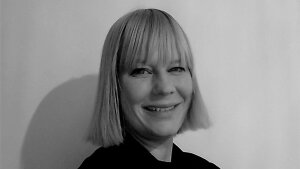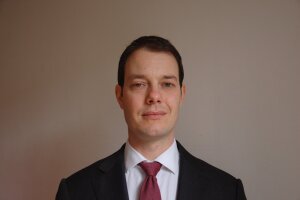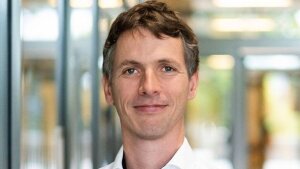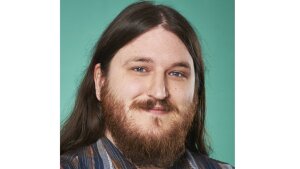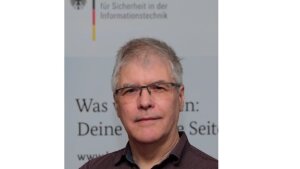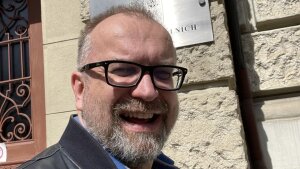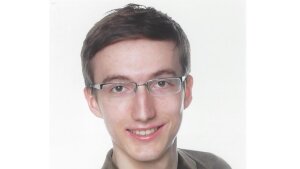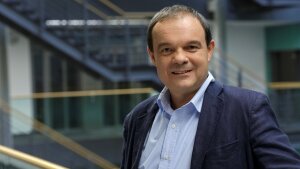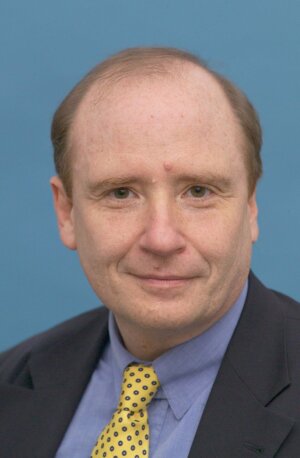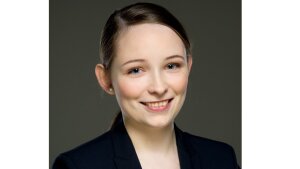
Robert Axmann
Robert Axmann
Foto: privatRobert Axmann studied Aerospace Engineering in Munich, Germany and Cranfield United Kingdom and got a PhD in aerospace engineering. He holds also a master in business administration. He works for the German Aerospace Center (DLR e.V.), initially for different satellite missions as well as the International Space Station in the area of operations. From 2017 onwards, he was the Founding Director of the DLR Institute of Data Science in Jena and also the head of the department Strategy Space Research and Technology. Since summer 2021 he is head of the DLR Quantumcomputing-Initiative.
LinkExterner Link to "Quantumcomputing-Initative".
Astrid Bötticher
Astrid Bötticher
Foto: A. BötticherAstrid Bötticher PhD, is postdoctoral researcher in the project "Freedom Spaces and Freedom Safeguarding in the Digital State" of the Liberty Profile line at the University of Jena. She is working in Jena on her Habilitation in comparative politics on technopolitics with a special focus on second generation quantum technology. The habilitation is located at the intersection of radical innovations, national innovation systems, and power politics, and its content is dedicated to the topic of innovation policy and here in particular quantum computing in comparison with Europe, the USA, and China.
Astrid Bötticher completed her doctorate at the Universiteit Leiden, at the Institute of Security and Global Affairs in The Hague, advised by Alex P. Schmid, director of the Terrorism Research Initiative (TRI) and Edwin Bakker, professor in Terrorism and Counterterrorism. She has worked on artificial intelligence, security-related agencies and organizations, online extremism - and radicalization, and other topics of technology-related political action.
“Technology development is an increasingly important driver of economic prosperity and political power, all the more so in the knowledge economy and its massive economic and political interdependencies in the age of globalization and digitization. Yet, this is a two-road lane – as those developing technology will determine who is empowered by it. Who has access to and control over technology and its development might sets incentives, might be able to bring in legacy into institutions or can set patterns for action. Technology is a traditional guarantor of power for politics. The intertwining of technology and politics is therefore nothing new.”
Ot van Daalen
Portrait Ot van Daalen
Foto: PrivatOt van Daalen is writing a PhD on quantum computing and human rights. He is also an attorney at his own law firm. He worked at the Dutch Data Protection Authority and is the founder of the Dutch digital rights movement Bits of Freedom. Before this, he worked at a top-tier law firm.
Dario Dubberstein
Portrait Dario Dubberstein
Foto: PrivatDario holds a B.Sc. in computer science with a focus on the theory of computation and computer architecture. While writing his bachelor thesis he was working for the Mercedes-Benz Group in developing a new ramp-up management software to improve the time-to-market development of the powertrain production. In 2021 Dario completed his M.Sc. in business informatics with a specialization in IT governance and management as well as data analysis. He is currently working at Friedrich-Schiller University on his Ph.D., an agent-based model to simulate a prediction of the diffusion of post-quantum encryption.
Falk Eilenberger
Falk Eilenberger
Foto: privatFalk Eilenberger studied Physics at the Friedrich-Schiller-University in Jena, which eventually lead to a Diploma Degree on Spatiotemporal Photonics. He then work on wave physics and optical communication at the University of Sydney. Upon returning he started to work on Light Bullets for his PhD degree, which he received from the University of Jena 2014. He took up a position as Research Coordinator at the Fraunhofer-Institute of Applied Optics and Precision Engineering IOF, later being in charge of coordinating Quantum Photonics activities at IOF and the university’s Institute of Applied Physics.
He is now a Junior Research Group leader for Photonics in 2D-Materials. As such he is dealing with Quantum Communication and Quantum Computing.
Roland Groell
Manfred Lochter
Manfred Lochter
Foto: privatManfred Lochter studied mathematics and physics in Cologne and Saarbrücken. In 1992 he received his Ph. D. from the University of Cologne. Since 1994 he works for the German Federal Office for Information Security (BSI), section Requirements for and Development of Cryptographic Mechanisms. His interests include number theory, elliptic curve cryptography, factoring, side-channel analysis and the implementation of cryptographic mechnisms in hardware and software. Currently his focus is on quantum technologies and the migration to quantum safe cryptography.
Miroslav Mares
Portrait Miroslav Mareš
Foto: PrivatMiroslav Mareš (1974). Professor at the Department of Political Science, Faculty of Social Studies of the Masaryk University in Brno (Czech Republic). He is the guarantor of the study program Security and Strategic Studies and researcher of the International Institute of Political Science. He is member of the board of the study program Cyber security at the Faculty of Informatics of the MU.
He focuses on the research on security policy, namely in the Central and Eastern European context. He is a member of the European Expert Network on Terrorism Issues, expert in the expert pool of the Radicalisation Awareness Network and expert in the expert pool of the European Centre of Excellence for Countering Hybrid Threats.
Adrian Marotzke
Adrian Marotzke
Foto: privatI am a PhD Student in the Industrial System Innovation Team of NXP Semiconductors in Hamburg, and am researching in the field of secure hardware implementations of Post-Quantum-Cryptography.
As part of the submission team of the PQC-Scheme NTRU Prime, I am also taking part in the standardization process of NIST.
LinkExterner Link to NXP´s company website.
Manfred Paeschke
Manfred Paeschke
Foto: privatDr. Manfred Paeschke works as Chief Visionary Officer for the Bundesdruckerei GmbH. Since 1999, he has been working for the Bundesdruckerei in the innovations field looking for new security concepts. Manfred Paeschke is inventor of over 150 patents and patent applications. He is also coeditor of the eID-Security Handbook. After studying Physics at the University of Rostock (1981-1986), he earned his PhD in 1998 at the University of Kiel.
Dr. Manfred Paeschke, Chief Visionary Officer, Fellow, Bundesdruckerei GmbH, Kommandantenstr. 18, D-10969 Berlin, GERMANY, Phone: + 49 (0) 30 - 2598-1163, Fax: + 49 (0) 30 - 2598-3370, Email: manfred.paeschke@bdr.de, www.bundesdruckerei.de
Johannes Ruhland
Portrait Johannes Ruhland
Foto: PrivatSince 1994: Holder of the Chair of Business Administration and Information Systems at the Friedrich Schiller University Jena
1990-1994: Professor of Business Administration and Methodological Planning at the University of the Federal Armed Forces, Munich and establishment of the Chair of Business Information Systems at the Friedrich Schiller University Jena
1984: Diploma in Business Administration
1974-1980: Studies of Business Administration, Mathematics and Physics at the Ludwigs-Maximilians-University Munich
Paulina Schindler
Paulina Schindler
Foto: privatPaulina Schindler is a research associate at the Friedrich Schiller University Jena, teaching students in the field of business informatics and researching as part of the "Liberty"-research branch. After receiving her B. Sc. in E-Commerce and M. Sc. in Business Informatics, she is currently researching on the topics fake news, intermediaries, social media, hate speech and quantum computing.
Antonio J. Alonso Timón
Antonio J. Alonso Timón
Foto: privatProfessor Antonio J. Alonso Timón studied at the Complutense University of Madrid where he graduated in 1993 and obtained his doctorate in 1998. For 2 years he taught at the Complutense University as Associate Professor. In the year 2000 he began teaching at the Comillas Pontifical University Law School, where he has taught undergraduate, graduate and postgraduate degrees. He is currently Director of the Center for Innovation in Law (CID-ICADE), Co-director of the Pérez-Llorca Chair on Economics and Competition Law, and Coordinator of the Administrative Law Area.
He is also an official of the General State Administration (Legal Technician of the Railway Infrastructure Administrator (ADIF), on leave of absence.
LinkExterner Link to Universidad Pontificia Comillas.
More speakers
- Dr. Sandro Gaycken (founder and director of the Digital Society Institute at ESMT Berlin)
- Dr. Robert Axmann (Head of Division German Aerospace Center)
- Roland Groell (Forschungszentrum Informatik Karlsruhe)

